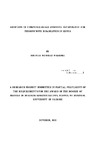| dc.description.abstract | This study explores the many socio-cultural, technical, economic, and environmental factors that influence the adoption and usage of computer-based assistive technologies by persons with disabilities. As using an assistive technology may make one’s disability obvious to others, choices made about technology usage are multifaceted social negotiations involving issues of identity, normalcy, and nature of disability.
The key approach used in this research is the Technology Acceptance Model (TAM). This model is extended to include Technological and Environmental contexts to include other factors that influence adoption of assistive technology. The study found out that perceived ease of use, perceived usefulness, environmental and organizational contexts influenced attitudes towards adoption of assistive technologies. It also established that attitudes were not linked with the intention to use since persons with disabilities would use the technologies if they were available and at affordable prices. The study recommended that similar studies be conducted without perceptions and involve the actual computer-based assistive technology use since these were not assessed. | en |

